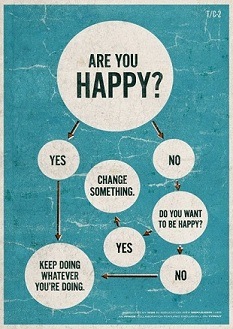Social Media systems inside organizations should not be designed just to support tasks. Social business systems should also be designed to support the emotional elements of interpersonal relationships, since these build momentum by helping us feel more meaningful and valuable as we work together.
Often, people assume that digital social systems inside organizations should help us move specific, particular tasks forward. “If these systems help us edit documents, send updates, check information, and find resources,” we think, “they’ll help us get work done better and faster. But if these systems make the social, emotional, personal/collective experience of doing those tasks more pleasant, that’s a side benefit. It’s not critical.”
That view couldn’t be more wrong.
Our social business systems should help us capture and share positive socio-emotional feelings related to doing work tasks, since these emotions are critical for generating productive momentum.
Generating Productive Momentum
I just cracked open a new book, The Progress Principle: Using small wins to ignite joy, engagement, and creativity at work, by Teresa Amabile and Steven Kramer. The Progress Principle gives us a different way to identify what generates productive momentum and to make sure we’re designing systems that support all the elements that matter to productivity.
According to The Progress Principle, there are two forces that make productive momentum possible: “catalysts” and “nourishers”.
(I wish their labels sounded more like actions or tools and less like personality types, but I’ll stick with their labels for now.)
“Catalysts” are actions that directly support the work on the project. Catalysts include firm goals, operational autonomy, action steps, access to resources, and clear progress indicators. These features are usually built right into knowledge management, enterprise, and collaboration software. They’re what many people imagine when they think of digital work systems.
“Nourishers” are interpersonal communications that share feelings and reflect the qualities of our work relationships. Nourishers lift our spirits, encourage us, and support us socially & emotionally as we work. Amabile and Kramer highlight nourishers like demonstrating respect, offering encouragement, offering emotional support, and developing a sense of affiliation. Actions that affirm identity, link activity to purpose, and offer chances to contribute from one’s unique knowledge set also nourish momentum.
Social Media systems of engagement can support both catalysts and nourishers.
Catalysts: Social media systems help us generate productive momentum simply by making work easier to do. In addition to helping us do the actual work, social media helps us see the progress of our work, by surfacing, recording, tracking and aggregating the actions that move the tasks along.
Nourishers: Social media systems can also help us generate productive momentum by supporting the social & emotional experiences that keep us engaged in our work. Features that support our day-to-day relational work, and features that allow us to share our moods, remind us to send thanks, prompt us to broadcast accolades, and maintain an ambient feeling of being ‘with’ others working digitally alongside us, can support and sustain positive relationship experiences.
Tools that help us surface, recognize, savor and celebrate positive interactions generate momentum by making work personally and collectively meaningful.
Catalysts are productivity generators that software designers, IT managers, and project managers are most likely to pay attention to. But nourishers are productivity generators that leaders pay attention to.
Leaders who want to generate momentum:
- When you think about the systems you are building for your organizations, are you supporting not only catalyzing actions but also nourishing actions?
- Are you paying attention to how your tools could provide socio-emotional support that builds individual and group momentum?
- Are you helping to learn and to teach others how to use the tools you have to convey both task information and positive social information?
For individuals and collectives actually to be productive, both the tasks and the positive social experience of doing these tasks must be supported. Social media systems should be designed so that we have tools to capture, record, and convey when we experience ourselves, our colleagues, and our work activities in positive ways.
Thanks to Terri Griffith for the head’s up about The Progress Principle.
See also:
How Social Media Reveals Invisible Work
Rearranging Chairs as an Act of Leadership
 I am an organizational consultant, change advocate, and organizational identity/reputation scholar with a PhD in leadership & organizations. I research, write about, and consult with organizations on the relationships between organizational identity, actions, and purpose. I teach Technology Management, part-time, at Stevens Institute of Technology.
My current research focuses on how social technologies in the workplace can drive organizational change, generate meaning, and catalyze purpose. See the
I am an organizational consultant, change advocate, and organizational identity/reputation scholar with a PhD in leadership & organizations. I research, write about, and consult with organizations on the relationships between organizational identity, actions, and purpose. I teach Technology Management, part-time, at Stevens Institute of Technology.
My current research focuses on how social technologies in the workplace can drive organizational change, generate meaning, and catalyze purpose. See the 
{ 1 comment }
Interesting read, could takeaway a few points would love to utilize in my organization. Thanks for sharing.
Comments on this entry are closed.